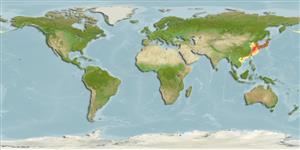Environment: milieu / climate zone / depth range / distribution range
Ecologia
marino demersale; distribuzione batimetrica 0 - 200 m (Ref. 43239), usually 0 - 20 m (Ref. 43239). Temperate
Northwest Pacific: Japan and Korea (Ref. 37630).
Length at first maturity / Size / Peso / Age
Maturity: Lm ?, range 15 - ? cm
Max length : 30.0 cm SL maschio/sesso non determinato; (Ref. 559)
Short description
Chiavi di identificazione | Morfologia | Morfometria
Spine dorsali (totale) : 76 - 83; Raggi dorsali molli (totale) : 0; Spine anali: 2; Raggi anali molli: 35 - 42; Vertebre: 83 - 90.
Facultative air-breathing in the genus (Ref. 126274); Found in tide pools or the intertidal zone to 20 m depth, on sandy-mud bottoms and among rocks of rocky reefs (Ref. 43239); also in eelgrass (Zostera marina) beds (Ref. 559). Sometimes to 200 m depth (Ref. 43239). Feeds on gammarids. Juveniles associate with drifting seaweed (Ref. 12114, 12115). Although rarely used for commercial food, this species is highly valued as fried fish in the spring months in Tokyo and neighboring areas (Ref. 7031).
Life cycle and mating behavior
Maturities | Riproduzione | Spawnings | Egg(s) | Fecundities | Larve
Nakabo, T., 2002. Fishes of Japan with pictorial keys to the species, English edition II. Tokai University Press, Japan, pp 867-1749. (Ref. 43239)
IUCN Red List Status (Ref. 130435)
Threat to humans
Harmless
Human uses
Strumenti
Special reports
Download XML
Fonti Internet
Estimates based on models
Preferred temperature (Ref.
123201): 13.2 - 22.7, mean 18.3 °C (based on 94 cells).
Phylogenetic diversity index (Ref.
82804): PD
50 = 0.5005 [Uniqueness, from 0.5 = low to 2.0 = high].
Bayesian length-weight: a=0.00257 (0.00157 - 0.00420), b=3.27 (3.13 - 3.41), in cm total length, based on LWR estimates for this species & (Sub)family-body (Ref.
93245).
Trophic level (Ref.
69278): 3.2 ±0.32 se; based on food items.
Generation time: 1.5 ( na - na) years. Estimated as median ln(3)/K based on 1
growth studies.
Resilienza (Ref.
120179): Alto, tempo minimo di raddoppiamento della popolazione meno di 15 mesi (K=0.7).
Fishing Vulnerability (Ref.
59153): Low vulnerability (22 of 100).
